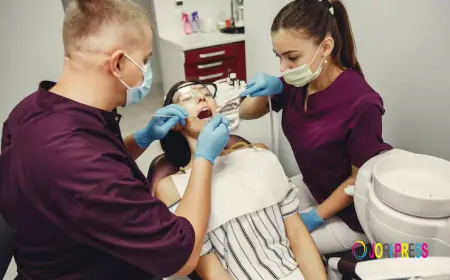Managing Seasonal Allergies While Under Orthodontic Treatment
Manage allergies effectively while wearing braces or aligners to maintain oral health and comfort throughout orthodontic treatment. link : https://www.alignproorthodontics.co.uk/practices/kendal https://www.outofhoursdentist.co.uk/practices/kendal

Seasonal allergies can pose unexpected challenges for individuals undergoing orthodontic treatment. Sneezing, congestion, and watery eyes are common symptoms that may seem unrelated to dental care, but they can significantly impact oral health and comfort. For patients with braces, aligners, or other orthodontic appliances, allergy season can make daily hygiene routines more difficult and increase the risk of discomfort or minor emergencies. Understanding how to manage allergies effectively, while keeping orthodontic treatment on track, is essential for maintaining both oral health and the progress of your smile transformation.
Understanding the Impact of Allergies on Orthodontic Care
Orthodontic treatment relies on precise movement of teeth over time. Symptoms associated with seasonal allergies, such as mouth breathing, sinus pressure, and swelling, can interfere with this process. Mouth breathing, often caused by nasal congestion, dries out the mouth and reduces the natural cleansing effect of saliva. This can lead to plaque accumulation around brackets, wires, or aligners. Other consequences of untreated allergy symptoms during orthodontic treatment include:
- Increased risk of enamel erosion due to dry mouth.
- Irritation of the gums and soft tissues from braces rubbing against inflamed areas.
- Higher likelihood of appliance loosening or minor damage from frequent sneezing or nose wiping.
Recognising how allergies can interact with orthodontic care helps patients and caregivers take proactive steps to prevent complications.
Common Allergy Triggers and Their Effect on Oral Health
Environmental allergens can exacerbate oral discomfort during orthodontic treatment. Identifying triggers and understanding their potential impact on braces or aligners is key to prevention.
Typical Allergy Triggers:
|
Allergy Trigger |
Potential Oral Impact |
Effect on Orthodontics |
|
Pollen |
Dry mouth, minor irritation |
Increased plaque buildup around brackets |
|
Dust |
Sinus pressure, throat irritation |
Encourages mouth breathing, drying enamel |
|
Pet dander |
Oral inflammation, sensitivity |
Gum irritation near wires |
|
Mould |
Swollen tissues, oral discomfort |
May cause temporary appliance misalignment |
By recognising these triggers, patients can adjust routines, protect appliances, and maintain effective oral hygiene.
Strategies to Minimise Discomfort During Allergy Season
Even mild allergy symptoms can create discomfort or hygiene challenges during orthodontic treatment. Implementing targeted strategies ensures that oral health and appliance integrity are preserved.
Oral Hygiene Practices:
- Brush thoroughly after meals using a soft-bristled toothbrush and fluoride toothpaste.
- Use interdental brushes or floss threaders to clean around brackets and between teeth.
- Consider fluoride mouth rinses to combat enamel demineralisation caused by dry mouth.
Hydration & Moisturising:
- Drink plenty of water to maintain saliva flow.
- Use sugar-free chewing gum to stimulate saliva production.
- Apply oral moisturising gels if dryness persists.
Appliance Comfort Tips:
- Cover sharp or irritating areas of braces with orthodontic wax.
- Clean aligners more frequently to remove allergens and bacteria.
- Adjust elastics or retainers carefully if swelling or sensitivity occurs.
Quick Bullet Points for Daily Relief:
- Rinse with water after sneezing to remove pollen from the mouth.
- Use a humidifier at home to maintain oral moisture.
- Carry orthodontic wax and a small mirror for immediate comfort adjustments.
Medication Considerations for Allergy Relief
Allergy medications such as antihistamines or nasal sprays can alleviate symptoms but may also contribute to dry mouth or gum irritation. Patients should be mindful of these effects while undergoing orthodontic treatment.
Tips for Managing Medication Side Effects:
- Take medications as prescribed, ideally with guidance from both your GP and orthodontist.
- Use saliva substitutes or drink extra water to combat dryness.
- Maintain rigorous oral hygiene to prevent plaque accumulation or enamel damage.
Balancing symptom relief with dental health ensures that allergy management does not interfere with orthodontic progress.
When to Seek Professional Advice
Not all allergy-related issues can be managed at home. Certain signs indicate that immediate professional care may be necessary:
- Persistent pain or swelling in the mouth or gums.
- Signs of infection, such as redness, pus, or persistent bleeding.
- Appliance issues caused or worsened by allergy symptoms, including loosened brackets or wires.
- Severe dry mouth that cannot be managed with hydration alone.
In these cases, contacting an emergency dentist in Kendal or your orthodontist Kendal ensures prompt evaluation and intervention. Early professional care helps protect treatment progress and prevents minor issues from escalating.
Preventive Measures for a Smooth Allergy Season
Proactive measures significantly reduce the risk of oral discomfort or orthodontic complications during allergy season.
Oral Hygiene Adjustments:
- Brush thoroughly around brackets, wires, and aligners after meals.
- Floss daily using threaders or water flossers to remove trapped allergens.
- Consider fluoride treatments for extra enamel protection.
Dietary and Lifestyle Adjustments:
- Avoid foods that are hard, sticky, or sugary, which can compound enamel wear during dry mouth episodes.
- Stay hydrated to maintain saliva production.
- Wear face masks outdoors during high pollen days to minimise allergen intake.
Routine Check-ups:
- Attend regular orthodontic appointments to monitor appliances and adjust care plans as needed.
- Collaborate with your general dentist for additional preventive measures.
Emergency Kit Essentials:
- Orthodontic wax for discomfort relief
- Small mirror for inspections
- Interdental brushes for precise cleaning
- Contact details for orthodontist and emergency dentist
Having these tools on hand allows for quick responses to minor issues, keeping treatment on track and reducing stress.
Tips for Maintaining Oral Health with Allergies
Daily habits, combined with preventive care, help orthodontic patients minimise the impact of seasonal allergies.
Key Daily Habits:
- Brush thoroughly around brackets and wires, twice a day or after meals.
- Floss daily, utilising threaders or water flossers.
- Rinse with fluoride mouthwash to strengthen enamel.
- Monitor for unusual spots, irritation, or plaque buildup.
Emergency Preparedness:
- Keep contact details for both your orthodontist and emergency dentist in Kendal readily available.
- Know when symptoms like persistent pain, bleeding, or appliance damage require professional intervention.
- Maintain a small oral care kit with wax, brushes, and gels for on-the-go relief.
Consistent monitoring and proactive management prevent small issues from becoming major disruptions to treatment.
Conclusion
Seasonal allergies do not have to hinder orthodontic treatment. With careful management, proactive hygiene, and preventive strategies, patients can maintain both comfort and oral health throughout allergy season. Maintaining hydration, monitoring for irritation, using orthodontic wax when needed, and attending regular check-ups are crucial for preventing minor issues from escalating.
By preparing an emergency kit and staying in close communication with the dental team, patients can navigate allergy challenges confidently. The dedicated orthodontic and dental professionals in Kendal provide expert guidance, ensuring that every smile remains healthy, aligned, and stress-free during seasonal changes.
emergency dentist in Kendal, orthodontist Kendal
What's Your Reaction?
 Like
0
Like
0
 Dislike
0
Dislike
0
 Love
0
Love
0
 Funny
0
Funny
0
 Angry
0
Angry
0
 Sad
0
Sad
0
 Wow
0
Wow
0


















































